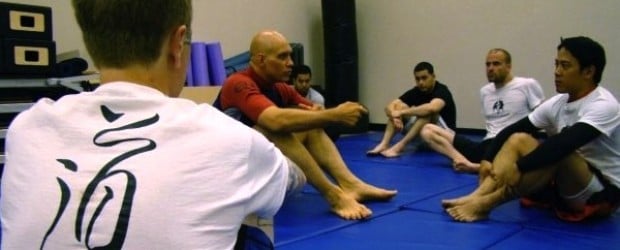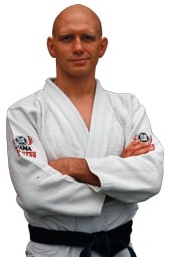
I got the following question on Twitter where I hang out as @stephankesting. I think it’s a question worth exploring because a lot of people find dealing with strong, large and aggressive wrestlers very difficult.
Question:
Hi Stephan,
I’ve been training BJJ for a few years now, but I get frustrated when I roll with one particular bigger, stronger whitebelt coming from a wrestling background. When I say ‘big’ I mean that it’s tough to even close my guard around him.
Like I said, he has a wrestling background and good takedowns, so I pull guard (which is what I mostly do) and we end up in my guard. But if I go for an armbar he can posture up and rip his arm out with no problem, which means that I lose position.
I’ve been watching a few of your how to defeat the bigger, stronger opponent videos on youtube, but he’s huge and I’m small. Should I change my game and worry about getting on top and controlling him from there, or should I keep working my guard. Thought I’d ask you seeing as I have the opportunity…
Osss!
Walter
My Answer:
Hi Walter,
Good for you for hanging in there. Jiu-jitsu is an art where science can triumph over nature, which means that smaller people with technique can control and defeat bigger people who have a lot more muscle on their side.
But the bigger the size discrepancy then the bigger the skill difference needs to be to compensate…
If your opponent is 10 lbs larger than you then all you might need is a few months of training, or one semi-reliable technique to do pretty well.
But if we’re talking about someone who is 50 to 100 lbs heavier than you…. and also athletic… and also with a background in another grappling sport like wrestling or Judo… well you might need to be a full belt rank or two more skilled than him to definitively win that match!
So the simple answer is to keep training. You’ll keep on getting better, and when the next testosterone-soaked wrestler wanders into the club then you’ll probably have quite a few more tricks up your sleeve to deal with monsters like that.
But what about right now?
Yes, you’re probably going to have to start from the guard. And that means you have to keep him there!
The first thing you should concentrate on is not letting him pass your guard. If he gets past your legs then you’re going to suffer!
But that doesn’t mean you simply clamp your legs shut and hold on for dear life.
Instead you should develop your leg dexterity and guard retention skills so that it’s really tough for him to blast past your legs. You should always be gripfighting, scooting your butt, moving your hips, maintaining the correct distance, and never let him control your legs.
The video below by Elliott Bayev and I will show you what these movements might look like in reality…
OK, so let’s assume you’ve put in the time learning how to keep him in your guard regardless of whether your legs are open or closed.
Now it’s time to go on the offensive!
Let’s get clear that life would be better for you on top! On the bottom you have to carry his weight, which is probably quite tiring, especially as the round of sparring drags on.
If you get to the top then you can breathe a lot easier and not get worn out underneath all his weight. Also on top you can use your mobility to stabilise the position, attack with submissions, and hunt for his back (which is always a good idea against a bigger guy).
To move from the bottom to the top you have to attack with sweeps. Use your strongest limbs – your legs – and a game based mostly around the open guard to hit him with every sweep you know.
You can use submissions too, but the focus is sweeping. Hit him with 3 sweep attempts to every one submission attack.
Why more sweeps than submissions?
Well, at a high level you rarely see successful submissions applied from the guard that aren’t set up with some sort of sweep attempt first.
If you hit your sweep attack hard then it either works (and you end up on top), or it destabilises your opponent.
That moment when he is destabilised and still recovering from your sweep attack, THAT’S the time to either go for a second sweep in the opposite direction, or to unleash your submission attack.
Not only might his crappy body alignment give you an opening, but his the fact that he’s out of position will also make it harder for him to go ‘full gorilla’ using his weight and strength to simply power out of positions.
So the key is combinations: attack with the sweep and hit a second sweep to get to top. Or use the sweep to disrupt his posture and then hit him with a submission.
One example of such a tactic is shown by Brandon Mullins in this Youtube video. It comes after a series of attacks in which he has pulled his opponent forward. This naturally triggers a backward, defensive posturing reaction.
Knowing that this defensive posturing is coming allows Brandon to have a plan ready for just this contingency. Exactly the type of combination we were talking about!
Check out the video below.
Of course this is easier said than done: you need to train it.
Start with doing lots of repetitions of your sweeps and submissions until you feel comfortable with them. But don’t stop there!
The next thing you want to do is sit down with a training partner and workshop your strategy. Do some reps, get your partner to model your nemesis’s reactions, and then figure out what other opportunities that reaction gives you.
Then do repetitions of the combinations: attack with a sweep, follow up with another sweep. Attack with a sweep, follow up with a submission…
Take heart, I think you’ll get there.
Stephan Kesting


